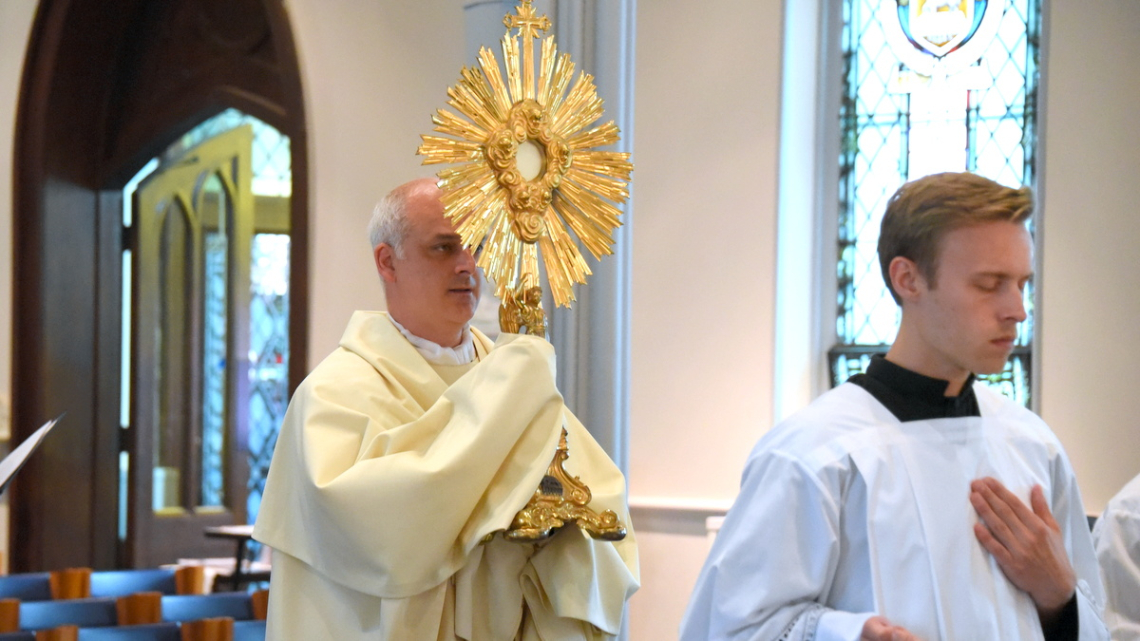From the Bishop - September 2022

“Before our response to Jesus’ invitation — well before — there is his desire for us. We may not be aware of it, but every time we go to Mass, the first reason we do so is that we are drawn there by his desire for us. For our part, the possible response is, as always, that surrender to this love, that letting ourselves be drawn to him” (n. 6).
These words are taken from a new apostolic letter by Pope Francis entitled Desiderio Desideravi, which revisits the importance of the Eucharist in the life of the Church. The letter’s name comes from Luke’s Gospel: “Desiderio desideravi hoc Pascha manducare vobiscum, antequam patiar,” which means “I have eagerly desired to eat this Passover with you before I suffer” (Lk 22:15). In its pages, the Holy Father invites the whole Church “to rediscover, to safeguard, and to live the truth and power of the Christian celebration.”
In compelling words, Francis reminds us that our Christian faith is in a person, not an idea. When we celebrate the Eucharist together, we encounter that person, Jesus Christ, our Savior. “The Liturgy guarantees for us the possibility of such an encounter. For us, a vague memory of the Last Supper would do no good. We need to be present at that Supper, to be able to hear his voice, to eat his Body and to drink his Blood. We need Him. In the Eucharist and in all the sacraments, we are guaranteed the possibility of encountering the Lord Jesus and of having the power of his Paschal Mystery reach us” (n.10-11).
The letter, both its contents and its call, is very timely as we enter into the National Eucharistic Revival, which launched on June 19, the Solemnity of Corpus Christi. The purpose of the revival is to renew the faith of God’s people in the great gift of the Eucharist as the source and summit of Christian life.
In the Diocese of Portland, we began our participation in the revival at the Neophyte Mass on Corpus Christi at the cathedral in Portland, as we celebrated with and prayed for those who were baptized and received into the full communion of the Church at Easter. During the Mass, we had a eucharistic procession. Similar processions were held at churches around the diocese and the country on Corpus Christi Sunday to remind us of our reverence for the Eucharist and the fact that we are called to take the real presence of Jesus into the world. Much in the same way, the National Eucharistic Revival aims to encourage Catholics to see the Sunday Eucharist as a profound encounter with Jesus. This encounter also inspires us as Catholics to take the authentic love of Jesus found in the Eucharist out into a world in great need of it.
In our diocese, participation in the national revival will build on what we have been doing in our efforts to invite people back to Mass. Pope Francis underlined for us the importance of our physical presence at Mass as he told us that “we need to be present at that Supper.” The liturgy of the Eucharist brings us together as a community. The liturgy does not say “I” but “we.” It “does not leave us alone to search out an individual supposed knowledge of the mystery of God. Rather, it takes us by the hand, together, as an assembly, to lead us deep within the mystery that the Word and the sacramental signs reveal to us” (n.19). We will continue during this time of revival to suggest to pastors and parish staff what might be done locally for parishioners to awaken amazement in the Eucharist. The revival will culminate in a National Eucharistic Congress in 2024 in Indianapolis, Indiana.
To some of you, this revival may seem like an exercise in reaffirming an obvious and glorious truth, but it was only three years ago that a Pew Research Center survey found that almost 70 percent of Catholics believe that the bread and wine used in holy Communion are just “symbols” of the body and blood of Jesus. As disheartening as it was to read the findings of that survey, it has also clearly inspired the Church to face this reality through education and renewal of an appreciation of the Eucharist as the privileged place where we meet Jesus.
This focus is central to the revival, but it is also of vital importance to the future life of the Church. The real presence of Jesus in the Eucharist is not just a theological truth. It is, for us, the followers of Jesus, a way of life. When we receive holy Communion, it is Jesus we receive, and our prayer when we receive Him is that we be in communion with Him and become like Him. His presence with us gives us direction for our lives and helps us to be more generous, attentive, and willing to listen to those around us. We are one with each other and one with Jesus as He offers Himself to the Father in reparation for our sins and the sins of the world.
The Eucharist is a privileged way in which we draw closer to Jesus our Savior. I hope that the revival will help that truth enter the hearts of many people in need of its comfort and renew awe and thanks for the Eucharist in the hearts of all the faithful.
God bless,
Bishop Robert P. Deeley, JCD
12th Bishop of Portland










